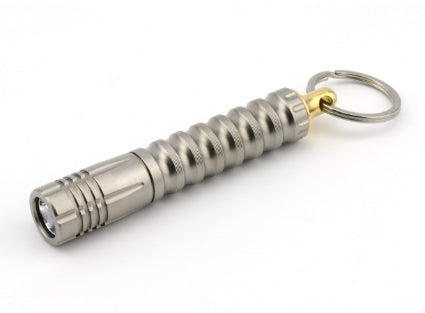Where it's Made
I do my best to be transparent in all things related to my products (and business in general) because I think it's important for you to have enough information to make informed decisions. A lot of companies will try to fool you in order to get your business. No sale is important enough to lie or mislead in order to close it. Just my two cents.
Every product I sell has a small flag icon in the "Specifications" tab. If you see a flag with the Prometheus logo on it, that means I make the product in my own shop. A Prometheus flag combined with a country flag means that I combine parts made in-house with parts from an outside vendor to complete the product.
| In Alphabetical Order (me first): | |
|
|
|
| Made in-house | |
| Australia | |
| China | |
| Finland | |
| Germany | |
| Hong Kong | |
| Italy | |
| Japan | |
| Mexico | |
| United Kingdom | |
| United States |
At present, I deal with over 70 different vendors all around the globe to make my tiny venture possible. That in itself is a huge management task. I outsource products and services to US vendors whenever I can. More than that, I outsource them locally. I get a lot of nice emails from machine shops around the country (and world) wanting to machine parts for me. Currently all machining is done in-house, but in the past if I got way behind on something I might have a local shop do a short run of parts to fill the gap. The two shops I used most often are a 10 minute drive away. I do this because I can get quality parts (with no supervision from me) even though the cost is very high.
I buy most of my raw metal stock from a small company that's three blocks from my shop. I could get it cheaper and faster from somewhere else local, but I don't...because I like them as human beings and because I know my small business helps support theirs. If I need material "yesterday" and they can't get it soon enough, I'll use a larger local vendor, but I try my best never to have material shipped in.
I also outsource a number of products and services from around the globe. None of my sourcing decisions are purely (or primarily) driven by profit motives. One thing that should be made clear: outsourcing does not mean going to a foreign country. It means utilizing resources outside of your own company.
For example, I outsource the manufacturing of my pocket clips through two different US vendors who work on different stages of the manufacturing: one in Massachusetts (couldn't get the expertise/quality locally) and another 5 miles away from my shop (I don't have the specialized equipment for mass production). My point is, outsourcing is not a big deal. You probably outsource your personal email logistics to Google or Hotmail...right? You probably outsource your demand for food to a grocery store or farm...right? What you should pay attention to is WHY companies outsource, not WHERE.
What follows is my own list from my own experience. I did not Google "reasons to outsource." If you do that you'll get a very different answer: dollars. That's because today's thought leaders are teaching this in our country's most prestigious business schools. Go ahead, try Googling it.
According to me, the reasons to outsource are an internal lack of: knowledge, experience, capacity, technology, market power, or supply chain integration. These things normally lead to better cost efficiency...but you'll notice that "cheaper" isn't on my list. That's because if you put "cheaper" on the list you don't actually know what you are doing, and you are part of the problem, not the solution. *microphone drop*




